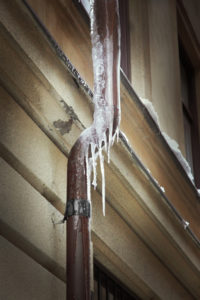Avoiding Frozen Pipe Water Damage
February in Colorado brings perfect powder, amazing animals, and a
winter wonderland in nature. However, the inside of your home could face some
serious risks due to frozen water pipes, broken water lines and water
damage. Homes left unoccupied without regulated heating face even more risk.
Team K Services is #1
choice when it comes to water damage restoration in Denver. We can quickly
extract standing water, dry the affected areas to get your property back to
pre-loss condition as quickly and as safely as possible.. Team K has live
managers on call all the time, you will never deal with an answering service.
They offer direct insurance billing to facilitate the relationship with the
insurer and promote timely payment. And most importantly, they will arrive at
your door in 90 minutes or less when you suffer from a water or fire disaster.
For 24 hour service, call 720-605-5183.
Frozen
pipes are a problem for a couple of reasons:
·
Any
lack of running water is inconvenient for the homeowner but it can also wreak
havoc on your appliances that require a flow, such as ice makers.
·
Once
the actual water in the pipe freezes, a pressure is created between the closed
faucet and the blockage that can build up to a point that causes the pipe to
explode.
·
If
the pipe bursts outside, this could also create dangerous slippery conditions
while the temperatures are below freezing.
When
the water starts to thaw out, your home could be facing massive damages.
Some Signs Of Frozen
Pipes
The
most obvious sign is a lack of running water. If a mainline is frozen, it can
cause minimal or no water to run through your faucets. When you see wet or
frosted pipes, it is an indication to turn off your faucets to prevent them
from bursting. Damp walls and ceilings can be from water leaking from frozen
pipes in basements or attics. And lastly, rely on your nose. If your sinks,
toilets, bathtubs, or drains have a bad odor, it can be the result of poor
drainage due to a broken pipe.
Precautions To Prevent
Freezing Pipes:
Clean
your gutters so melting snow and ice can flow freely
·
Turn
on your faucets and allow them to drip slowly. Moving water will prevent
freezing.
·
Heat
your house to a minimum of 65 degrees in the winter
·
Open
cabinet doors below sinks. It will help allow warm air to circulate.
·
Drain
your water system if you’re away for an extended time.
·
Disconnect
all gardening hoses and install covers on all outside faucets.
·
Identify
the location of the main water valve and the valve on your water heater.
·
Wrap
pipes nearest to exterior walls and in crawl spaces with pipe insulation or
with heating tape.
·
Close
all windows near water pipes; cover or close open-air vents.
·
Heat
your basement and seal your windows.
·
If
you plan to be away from home for an extended period of time, shut off water
supply valves to your washing machine.
·
Seal
air leaks surrounding or near pipes.
·
Keep
garage doors closed if there are water supply lines in the garage.
Tip:
Unheated attics were the most common cause of burst pipes so inspect your space
for vulnerabilities.
If A Pipe Freezes
If
a faucet or pipe inside your house freezes, you can thaw it using a good hair
dryer. When thawing a pipe, start thawing it nearest to the faucet. Make sure
the faucet is turned on so that melted water can drip out.
If A Pipe Bursts
You
have no time to waste, take these steps immediately:
·
Shut
off the water at the main valve.
·
If
the break is in a hot water pipe, the valve on top of the water heater should
be closed.
·
Call
Team K Services for immediate response. Keep an emergency number nearby for
quick access.
·
Take
proper precautions to avoid an electrical shock from being in or near standing
water.
Water Damage Restoration
InDenver


Experience the warmth in winter with Heavenly Heat floor heating solutions.
ReplyDelete